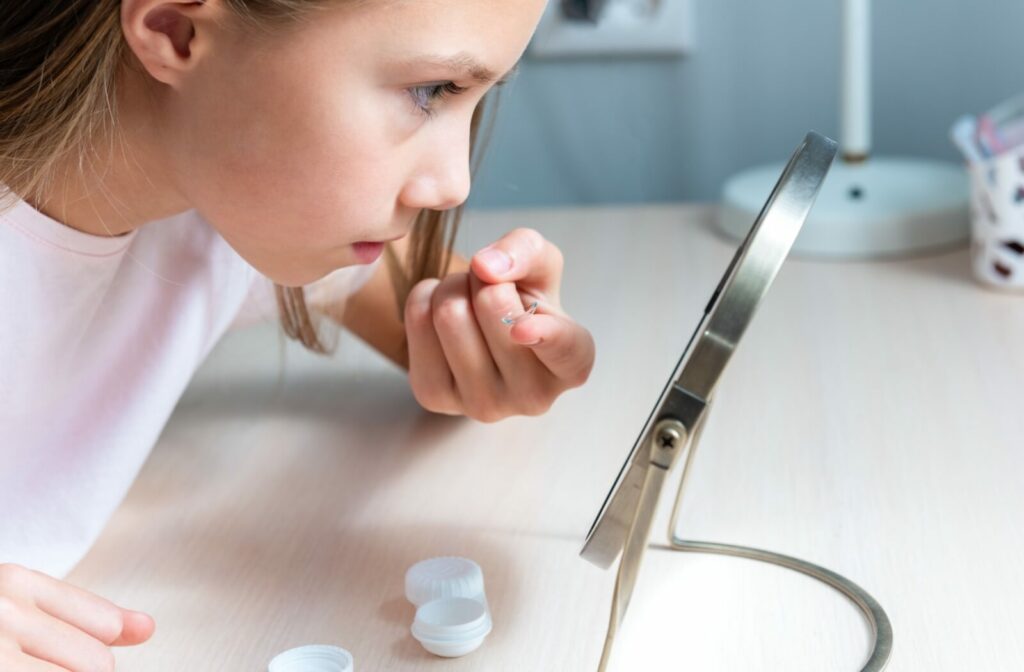MiSight contact lenses are a groundbreaking solution for children with myopia that corrects myopia and helps control myopia progression. If you’re a parent concerned about your child’s vision, an eye exam can determine their level of myopia and whether MiSight contact lenses can provide vision clarity and prevent myopia from worsening.
What Is Myopia & Why Does It Matter?
Myopia, commonly known as nearsightedness, is a vision condition where distant objects appear blurry while close-up objects can be seen clearly. Myopia happens when there’s a too-long eyeball or too steeply curved cornea (clear front part of the eye).
The irregular-shaped eye causes light to focus in front of the retina (the light-sensitive tissue at the back of the eye) rather than directly on it, resulting in blurry distant vision.
Other symptoms of myopia in children may include frequent squinting, sitting too close to the TV, being unaware of distant objects and excessive blinking or eye rubbing. A child’s risk of developing myopia increases if one or both parents have myopia, if they experience increased screen time, and decreased outdoor play.
Understanding Myopia Progression
Myopia is more than just a vision issue; it can lead to serious complications later in life if left unchecked. Myopia usually begins in childhood and tends to progress as the child grows because the eyes continue to grow as well.
The earlier a child develops myopia, the more likely it is that the condition will worsen over time. Myopia progression can lead to high amounts of myopia or severe myopia can lead to higher prescriptions in children and can increase the risk of sight-threatening vision conditions later in life, such as:
What Are MiSight Contact Lenses?
Regular contact lenses can correct myopia to provide vision correction. However, they can’t address specific needs such as myopia progression. MiSight contact lenses are specialty soft contact lenses that can correct myopia and control myopia progression. MiSight lenses are particularly beneficial for children aged 8 to 12 diagnosed with myopia.
How MiSight Contact Lenses Work
Myopia progression occurs when the eyeball grows too long from front to back or axial elongation. Treatment includes myopia control methods that work by slowing the elongation of the eye.
MiSight contact lenses employ peripheral defocus to simultaneously correct vision and manage myopia progression. This innovative technology allows the child to see clearly while also slowing down the elongation of the eye. Wearing MiSight contact lenses over 3 years reduced the rate of myopia progression by 59%.
MiSight contact lenses have 2 zones or 2 different focusing powers:
- Central correction zone: This part has full focusing power to correct myopic vision, allowing the child to see clearly.
- Peripheral treatment zone: These zones around the periphery have a lower focusing power that creates myopic defocus, which allows light entering the eye to focus on the retina instead of behind it. Peripheral defocus signals the eye to slow down its elongation process.
MiSight Contact Lens Safety & Comfort
One of the primary concerns parents have when it comes to contact lenses for their children is safety. Parents often worry about issues like eye infections and discomfort.
However, MiSight lenses are soft contact lenses that are FDA-approved. They are also single-use daily disposable wear, meaning they are worn during the day and discarded at night, making them a hygienic option and comfortable for all-day wear.
The Role of Your Optometrist

Optometrists play a crucial role in the successful use of MiSight lenses. They conduct comprehensive eye exams to determine if MiSight lenses are the right fit for your child and provide detailed instructions on how to use and care for them. Regular check-ups with your optometrist are also essential to monitor the effectiveness of myopia control measures and make any necessary adjustments.
Other Myopia Control Methods
If MiSight contact lenses are not the right myopia control approach for your child, there are other methods to prevent myopia progression:
- Defocus glasses: These lenses have DIMS technology or defocus multiple segment technology with a central zone that corrects myopia and ringed zones with alternating powers to manage myopia progression.
- Orthokeratology: Orthokeratology lenses are hard lenses that temporarily reshape the cornea and can slow myopia progression.
- Atropine eye drops: Low-dose atropine eye drops reduce the focusing strength of the eye muscles and help slow myopia progression.
Individualized Myopia Management
MiSight contact lenses and other myopia control methods can help manage myopia in children. They offer a dual benefit of clear vision and myopia control, making them an excellent choice for parents concerned about their child’s eye health.If you think MiSight lenses could benefit your child, book an appointment with Maple Ridge Eye Care and take the first step towards protecting their eye health today and in the future.


